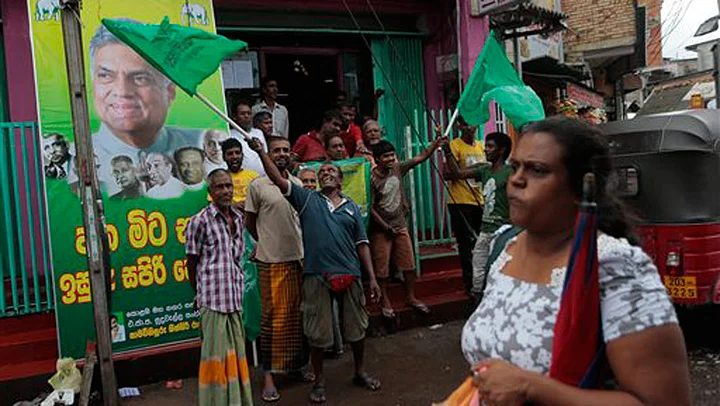New Era Beckons
- President Sirisena would be mediating now on behalf of UPFA to form a government, relieving Wickremesinghe from horse-trading
- A major step towards ethnic reconciliation would be realised if Sirisena and Wickremesinghe win over the Tamil National Alliance
- Sri Lanka, which embarked on a new phase of democratisation and ethnic reconciliation after Sirisena’s victory in January, is now in a position to forge ahead
- Rajapaksa’s highly personalised foreign policy resulted in Sri Lanka tilting towards China, at the expense of India
- Visits by Narednra Modi and US Secretary of State John Kerry were evidence of Sri Lanka’s desire to rejoin with the free world
The just concluded parliamentary elections in Sri Lanka did not produce a clear winner. But, that is, still, the best the country could have expected. It would now pave way for a national government not out of choice, but a necessity. Forming a national government under which both major parties join rank to govern the country is, in fact, a promise made by both President Maithripala Sirisena and Prime Minister Ranil Wickremesinghe during the last two election campaigns.
That is, also, not a bad choice for a country which saw a landslide electoral victory by the then ruling United People’s Freedom Alliance (UPFA) in the previous parliamentary polls in 2010, subsequently being plundered by the then party leader and strongman president Mahinda Rajapaksa to prop up his dynastic ambitions.
In Monday’s elections, both the United National Party (UNP) led by Wickremesinghe and the UPFA (led by former president Rajapaksa) failed to win an absolute majority in 225-member- parliament. The UNP, which secured the highest number of seats (106, still seven short of a clear majority in the House) is now expected to form a national government and Wickremesinghe will be sworn in as the prime minister, today. UNP’s main rival, UPFA won 95 seats. The main Tamil Party, Tamil National Alliance (TNA) won 16 seats and the Marxist Janatha Vimukthi Peramuna (JVP) secured 6 seats.
Coalition Government Likely
Sirisena, who is also chairman of the SLFP, the main constituent party of the UPFA, will now use his good offices to shepherd his MPs to a national government with the UNP .
Last week, Sirisena said that he would mediate on behalf of the UPFA to get the required number of MPs to form a government, if his party wins the election. Now, he will be doing the same, but, this time on behalf of the UNP. Wickremesinghe will be relieved from the onerous task of horse trading.
The 19th amendment to the constitution, one of the first tasks undertaken by the Sirisena- Wickremesinghe administration, to empower independent institutions and prune discretionary powers of the presidency, also set a limit on the number of cabinet ministers to 30 and other non-cabinet ministers to 40.
However, the same amendment stipulates that in the case of a national government, the number of ministers can be determined by an act of parliament. That would mean, if nothing else, there would be plenty of ministerial portfolios to woo recalcitrant opposition MPs into a national government.
Rajapaksa’s New Role
Former President Rajapaksa campaigned, eyeing for the post of prime minister. His hopes were dashed. During the election campaign, he played all his cards, including one detested by many: a not so covert effort to incite communalism among Sinhalese voters. Sirisena publicly urged him to refrain from doing that.
Now, Rajapaksa has refused to join a national government, but has said he would support ‘good policies while remaining in the opposition’. It is not yet clear whether he would try to scuttle the formation of the national government.
Beginning of Ethnic Reconciliation
The main Tamil Party, TNA (Tamil National Alliance) is the other main political actor. It supported Sirisena in his presidential bid and maintains better ties with the UNP. Earlier, TNA said it would not join a national government, but if the UNP wins, it would support from the outside.
However, should Sirisena and Wickremesinghe win over the TNA into their fold (and if the moderate leadership of the TNA overrides the protestations by the remnant of Tiger sympathisers and join main Sinhalese parties at the National level) that would be a major step towards ethnic reconciliation.
All in all, the election heralds a new era of optimism in Sri Lanka. The island nation, which embarked on a new phase of democratisation and ethnic reconciliation after Sirisena’s election victory in January, is now in a position to forge ahead. The acid test, nonetheless, would be finding a bipartisan political solution to the ethnic problem.
New Regime More Reliable
Rajapaksa’s highly personalised foreign policy resulted in Sri Lanka tilting towards China, at the expense of India and his bedding with despots of some of the least salubrious countries. Sirisena and Wickremesinghe during the last six months, tried to rectify those myopic policies and to a good degree, they succeeded.
The visits by Prime Minister Narendra Modi, the first bilateral visit by an Indian premier in 28 years and US Secretary of State John Kerry in Sri Lanka were evidence of that mutual understanding, and Sri Lanka’s desire to rejoin with the rest of the free world.
However, as Wickremesinghe has said, Sri Lanka would not shun Chinese investments, but, it would now create a level-playing field for investors and opt for competitive bidding for foreign loans. If the past six months are any guide, Sri Lanka under the Sirisena- Wickremesinghe combination would be a more reliable and trustworthy partner to India, the US and the West.
(The writer is a Sri Lankan journalist)
